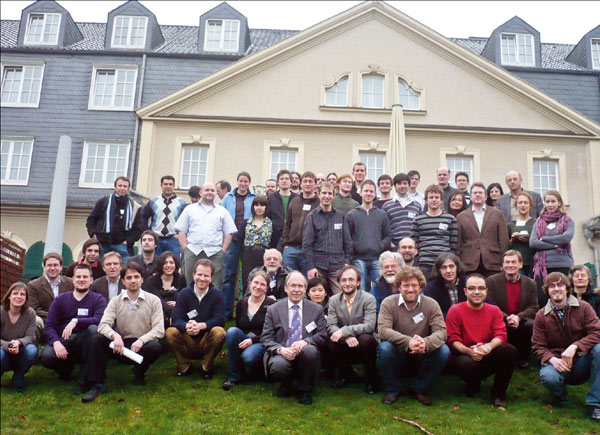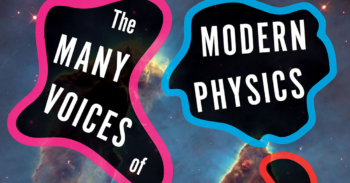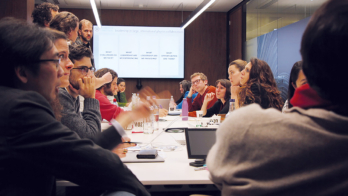A report on a new interdisciplinary school held in Germany.

Image credit: IZWT-Wuppertal.
At the end of March, the first Spring School on Philosophy and Particle Physics took place in Maria in der Aue, a conference resort of the archbishopric of Cologne in the rolling hills of the area called Bergisches Land, between Cologne and Wuppertal. It was organized by the members of the Deutsche Forschungsgemeinschaft’s interdisciplinary research project, “Epistemology of the Large Hadron Collider”, which is based at the Bergische Universität Wuppertal. Part of the time was reserved for lecture series by distinguished representatives of each field, including: Wilfried Buchmüller, Gerardus ’t Hooft, Peter Jenni and Chris Quigg from physics; Jeremy Butterfield, Doreen Fraser and Paul Hoyningen-Huene from philosophy; and Helge Kragh from the history of science. The afternoons were devoted to five working groups of philosophy and physics students who discussed specific topics such as the reality of quarks and grand unification. The students then presented their results at the end of the school.
The large number of applications – more than 100 for 30 available places – from PhD students and young post-docs from all over the world demonstrated the strong interest in this interdisciplinary dialogue. There was an almost equal share of applicants from physics and philosophy. The pairing of students and lecturers from such different backgrounds made the school a great success. Almost all of the students rated it “very good” or “excellent” in their evaluations.
Theory and reality
The diverse academic backgrounds of the participants stimulated plenty of discussions during the lectures and working groups, as well as late into the night over beer. They centred on the main lecture topics: the reality of physical theories and concepts, experimental and theoretical methods in particle physics, and the history and philosophy of science.
For example, one of the working groups was concerned with the question, “Are quarks real?” Most physicists would, of course, answer “yes”. But then again, the existence of quarks is inferred in a way that is indirect and theory laden – much more than for, say, chairs and tables. Are there different levels of reality? Or are quarks just auxiliary constructs that will be superseded by other concepts in the future, as happened with the ether in the 19th century, for example? A comprehensive picture of philosophical attitudes towards the reality content of physical theories was discussed by the philosopher Hoyningen-Huene of the University of Hannover. His lecture series also presented critically other aspects of the philosophy of science, focusing on the classic ideas of Karl Popper and Thomas Kuhn: What qualifies as a scientific theory? Are physical theories verifiable? Are they falsifiable? How do physical theories evolve over time?
Fraser, of the University of Waterloo, and Butterfield, of the University of Cambridge, discussed the scope and applicability of particle and field concepts in the interpretation of quantum field theory (QFT), an area that is certainly one of the most successful achievements in physics. However, Fraser pointed out that the need for renormalization in QFT, as used in particle physics, reflects a conceptional problem. On the other hand, the more rigorous algebraic QFT does not allow for an interpretation in terms of particles, at least in the traditional sense.
Another topic that has attracted the attention of philosophers in recent years concerns gauge theories and spontaneous symmetry breaking, as Holger Lyre, of Otto-von-Guericke-Universität Magdeburg, discussed in his lecture. He asked whether it is justified to speak of “spontaneous breaking of a gauge symmetry” given that gauge symmetries are unobservable, a theme that was also discussed in a working group. Again, most physicists would take the pragmatic view that it is justified as long as all physical predictions are observed. Philosophers, however, look for the aspects of gauge theories that can count as being “objectively real”.
The contrarian attitudes between physicists and philosophers were put in a nutshell when a renowned physicist was asked whether he considers the electron to be a field or a particle, and the physicist replied: “Well, I usually think of it as a small yellow ball.” Pragmatism – motivated by a remarkably successful theoretical and experimental description of particle physics – clashed with the attempt to find unambiguous definitions for its basic theoretical constructs. It was one of the goals of the school to understand each other’s viewpoints in this context.
The physics lectures covered both experiment and theory. On the experimental side, Jenni, of CERN, and Peter Mättig, of the University of Wuppertal, discussed methods and basic assumptions that allow us to deduce the existence of new particles from electronic detector signals. As also discussed in one of the working groups, the inference from basic (raw) detector signals to claiming evidence for a theory is a long reach. The related philosophical question is on the justification of the various steps and their theory-ladenness; i.e. in which sense do theoretical concepts bias experimentation, and vice versa. Close to this is the additional question addressed in the discussion as to what extent the LHC experiments are fit to find any new particle or interaction that may occur.
The theory lectures of Robert Harlander, of the University of Wuppertal, Michael Krämer, of RWTH Aachen, and Quigg, of Fermilab, focused on the driving forces for new theories beyond the Standard Model. Apart from cosmological indications – comprehensively reviewed by DESY’s Buchmüller in one of the evening sessions – there is no inherent need for such a theory. Yet, almost everyone expects the LHC to open the door to a more encompassing theory. Why are physicists not happy with the Standard Model and what are the aims and criteria of a “better” theory? One of the working groups discussed specifically the quest for unification as one of the driving forces for a more aesthetic theory.
A current, highly valued guiding principle for model building is the concept of “naturalness”. To what extent are small ratios of natural parameters acceptable, such as the size of an atom compared with the size of the universe? As Nobel laureate ’t Hooft discussed in an evening talk, again there is no direct physics contradiction in having arbitrarily small parameters. But the physicists’ attitude is that large hierarchies are crying out for an explanation. Naturalness requires that a small ratio can arise only from a slightly broken symmetry. This is the background for many models that increase the symmetry of the Standard Model to justify the smallness of the weak scale relative to the Planck scale. Another idea that ’t Hooft discussed is to invoke anthropic arguments fuelled, for example, by the discovery of the string landscape consisting of something like 10500 different vacua.
Closely related to the philosophy of science is the history of science. The development of the Standard Model was the subject of one of the working groups and was also comprehensively discussed by Kragh, of the University of Aarhus. Looking at the sometimes controversial emergence of the Standard Model revealed lessons that may well shape the future. Kragh reminded the audience that what is considered “certain” today only emerged after a long struggle against some “certain facts” of former times.
At first glance, philosophical questions may not be directly relevant for our day-to-day work as physicists. Nevertheless, communication between the two fields can be fruitful for both sides. Philosophy reminds us to retain a healthy scepticism towards concepts that appear too successful to be questioned. In return, the developments of new experimental and theoretical methods and ideas may help to sharpen philosophical concepts. Looking into the history of physics may teach us how sudden perspectives can change. Coming at the brink of the possible discovery of new physics at the LHC, the school was a great experience, reflecting about what we as physicists take for granted. The plan is to have another school in two years.





